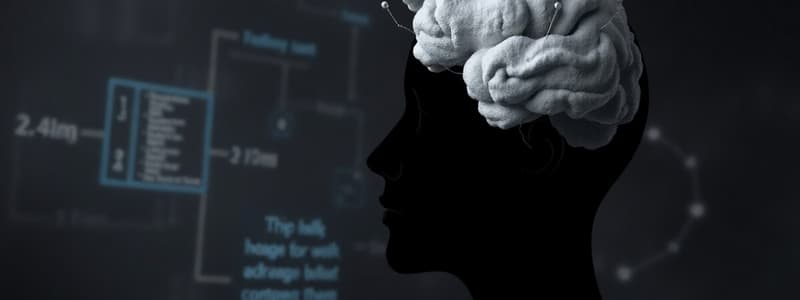Podcast
Questions and Answers
What is learning?
What is learning?
A process that results in a relatively consistent change in behaviour or behaviour potential based on experience.
Habituation is an example of a basic form of learning.
Habituation is an example of a basic form of learning.
True (A)
Who founded the school of thought known as behaviourism?
Who founded the school of thought known as behaviourism?
John Watson
Which of the following models is associated with classical conditioning?
Which of the following models is associated with classical conditioning?
What is an unconditioned stimulus (UCS)?
What is an unconditioned stimulus (UCS)?
What does extinction refer to in classical conditioning?
What does extinction refer to in classical conditioning?
Which schedule of reinforcement delivers a reinforcer after a fixed number of responses?
Which schedule of reinforcement delivers a reinforcer after a fixed number of responses?
Observational learning only occurs when one learns from their own experiences.
Observational learning only occurs when one learns from their own experiences.
What is the Law of Effect?
What is the Law of Effect?
Which of the following is an example of negative reinforcement?
Which of the following is an example of negative reinforcement?
Study Notes
The Study of Learning
- Learning is a process that results in changes in behavior or behavior potential based on experience.
- Learning-performance distinction refers to the difference between what has been learned and what is outwardly expressed.
- Habituation is a basic form of learning where repeated exposure to a stimulus leads to a decrease in response.
Classical Conditioning
- Classical conditioning is a form of learning where a neutral stimulus is associated with a naturally occurring stimulus, eliciting a predictable response.
- Ivan Pavlov's research on digestion in dogs led to the discovery of classical conditioning.
- The key elements in classical conditioning are:
- Unconditioned Stimulus (UCS): A stimulus that naturally elicits a response.
- Unconditioned Response (UCR): The naturally occurring response to the UCS.
- Conditioned Stimulus (CS): A neutral stimulus that becomes associated with the UCS.
- Conditioned Response (CR): The learned response elicited by the CS.
- Acquisition is the initial learning stage where the CS-UCS pairing strengthens the association and the CR emerges.
- Extinction occurs when the CS is repeatedly presented without the UCS, leading to a decrease in the CR.
- Spontaneous recovery refers to the reappearance of the CR after a period of rest following extinction.
- Stimulus generalization involves the extension of the CR to stimuli similar to the CS.
- Stimulus discrimination refers to the ability to distinguish between the CS and other stimuli that are not associated with the UCS.
Operant Conditioning
- Operant conditioning is a type of learning where behavior is modified by its consequences.
- Edward Thorndike's Law of Effect states that behaviors followed by satisfying consequences are more likely to be repeated.
- Discriminant stimulus signals that a specific behavior will lead to a particular consequence.
- Operant refers to a behavior that affects the environment.
- Schedules of reinforcement determine how often reinforcement is delivered, impacting the rate and persistence of behavior.
- Fixed-ratio (FR) schedule delivers reinforcement after a fixed number of responses.
- Variable-ratio (VR) schedule delivers reinforcement after an average number of responses, leading to high response rates and resistance to extinction.
- Fixed-interval (FI) schedule delivers reinforcement for the first response after a fixed time interval.
- Variable-interval (VI) schedule delivers reinforcement after an average time interval, leading to steady response rates.
- Negative reinforcement involves the removal of an aversive stimulus after a behavior, increasing the likelihood of that behavior.
- Punishment is a consequence that decreases the likelihood of a behavior.
- Positive punishment involves the delivery of an aversive stimulus after a behavior.
- Negative punishment involves the removal of a positive stimulus following a behavior.
Observational Learning
- Observational learning occurs when individuals learn by observing the behavior of others and its consequences, allowing for social learning.
- Bandura's Bobo doll experiments demonstrated that children learn aggressive behavior through observation and modeling.
- Factors influencing observational learning include the reinforcement of the model's behavior and the similarity between the model and the observer.
Studying That Suits You
Use AI to generate personalized quizzes and flashcards to suit your learning preferences.
Related Documents
Description
Explore the fundamental theories of learning, including habituation and classical conditioning. This quiz covers key concepts such as the learning-performance distinction, as well as Ivan Pavlov's groundbreaking work and its implications. Test your understanding of these essential psychological principles.




